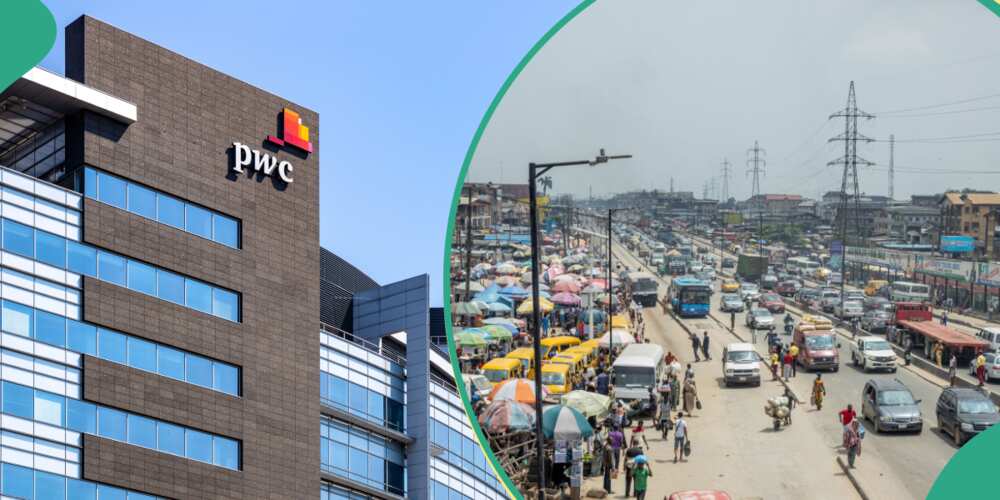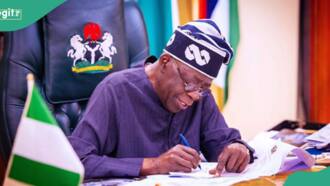Debt, GDP: PwC Lists Seven Trends That Will Shape Nigeria’s Economy in 2024
- PwC has released its prediction for Nigeria's economy in 2024, covering GDP, inflation, and exchange rate, among others
- The report highlighted seven important factors that will shape the trajectory of Nigeria's economy
- PwC expects Foreign Direct investment flows to improve in 2024, driven by notable expansion in the growing ICT
Legit.ng journalist Dave Ibemere has over a decade of experience covering Tech, Energy, Stocks, Investments, and Economy
PwC Nigeria, a professional services firm, stated that Nigeria's Gross Domestic Product would grow at 3.50% in 2024, with inflation expected to record a marginal decline.
The prediction was made in its latest Nigeria Economic Outlook report, which highlights seven key trends shaping Nigeria's economic trajectory in 2024.

Source: Facebook
In the report, PwC also said investors will be cautiously optimistic, consumers may likely adjust better to the evolving policy and macro realities, and the country may witness improved sectoral development riding on reforms.
Others are evolving monetary policy stances to find the right framework and instruments to achieve price stability, undulating pathways to unlocking productivity in the economy, persisting vulnerability to external pressures with the potential of 'shocks', and executing fiscal reforms by balancing ambition with budgetary implementation.
Part of the report reads:
“Security spending in the past nine years amounted to N14.8 trillion. Despite increased spending, insecurity remains a challenge and jeopardises national stability, negatively affects economic activities and undermines investor confidence.”
“We project a marginal decline in inflation and a 3.1 percent rise in Gross Domestic Product (GDP). Achieving sustainable growth in 2024 requires balancing ambitious fiscal reforms with effective budget implementation."
PwC economic forecasts
The report made available to Legit.ng, also highlighted the importance of aligning fiscal and monetary policy to stabilise prices and reach target goals.
According to PwC, foreign portfolio investment flows to the capital market may remain cautious due to residual challenges.
It said:
“Investors’ outlook may be dampened by downgrades from FTSE Russell and MSCI, specifically due to delays in capital repatriation. Despite this, Moody’s, Fitch, and S&P maintained a speculative credit rating due to drawbacks on reforms and several fiscal challenges that persist."
It added that Foreign Domestic Investment flows are expected to improve in 2024, driven by notable expansion in the growing ICT and manufacturing sectors.
Authors of the report also said the proposed fiscal reforms have the potential to boost non-oil revenue and shape the economy, but success hinges on effective budgeting and execution.
They added:
“Nigeria’s ambitious revenue targets for 2024 depend heavily on oil prices and reform implementation. Historically, actual revenue realised has averaged less than 70 percent of the total budget.
“Achieving budgeted oil revenue in 2024 will depend on OPEC oil production quota, international oil prices, improved security in the oil-producing regions, and geopolitical factors."
The report also noted that the allocated infrastructure spending budget for 2024 is N1.32 trillion, which falls short of both the World Bank's suggested 70% infrastructure-to-GDP benchmark (currently at 30%) and the yearly $150 billion requirement specified in the National Integrated Infrastructure Master Plan for 2021- 2025.
It said if the Russia-Ukraine war intensifies, it could lead to increased global energy and commodity supply risks. Nigeria may experience increased inflation and food security challenges due to grain import disruptions and high petroleum product costs.
“The outcome of elections in several countries globally, especially USA, UK, and Taiwan may shape the dynamics of trade and capital flows around the world in 2024.”
Consumer spending on food prices
PwC added that consumer spending may be pressured in 2024 due to rising prices of goods and services (increasing food and transportation costs) coupled with lower disposable income.
“However, private consumption is expected to be marginally better than in 2023. Poverty levels are projected to increase to 38.8 percent in 2024.

Read also
CBN tells Nigerians to anticipate new price of petrol as Dangote, Refinery, others start production
“Despite the low unemployment rate in the country, low consumer spending and purchasing power remain an issue, especially in the absence of a commensurate increase in the minimum wage to mitigate the inflationary growth in the economy.”
GDP inflation forecast
The firm also revealed that Nigeria's GDP may grow marginally by 3.1% in 2024 due to sustained policy reforms and that the growth projection is driven by ongoing reforms, recovering oil production, and a proactive policy environment.
It added:
“Possible downside risks to this projection include sustained rise in fiscal debt, elevated interest rates, high inflationary levels, foreign exchange liquidity pressures, high exposure to shocks in the global value chain, poor non-oil revenues, and sector development.
“In terms of sectoral growth, the main drivers of GDP growth in the last 12 months have been the financial services, information and communication, and utilities sectors. The firm expects these sectors to continue to drive growth in the short term."

Read also
Cardoso: CBN governor forecasts GDP growth as NESG rolls out macroeconomic outlook for 2024
A PwC economist in a chat with Legit.ng summarise the reports's 7 Seven trends that will shape Nigeria's economy in 2024 as
- Executing fiscal reforms: balancing ambition with budgetary implementation
- Evolving monetary policy stance: finding the right framework and instruments to achieve price stability
- Investors will be cautiously optimistic
- Undulating pathways to unlocking productivity in the economy
- Persisting vulnerability to external pressures with the potential of 'shocks.'
- Consumers may likely adjust better to the evolving policy and macro realities
- Improved sectoral development riding on reforms
Economist sets new exchange rate
Earlier, Legit.ng reported that the Economist Intelligence Unit (EIU), a research and analysis firm, predicted that the Naira would close in 2023 with an exchange rate of N848/$ in the official market.
The EIU also said by the end of the following year (2024), the Naira would be exchanged at N861.5 for a US dollar.
Similarly, the EIU predicted that the pressure on the Naira would ease in 2024 without CBN implementing harsh measures.
PAY ATTENTION: Donate to Legit Charity on Patreon. Your support matters!
Source: Legit.ng




